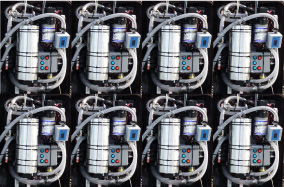Closing the Gap in Small Community Drinking Water Treatment

Canada has very high drinking water standards, however, many communities, especially in northern Canada, do not enjoy this high standard of quality. In some cases, communities simply do not have the resources to properly regulate their drinking water supply. It is especially common in small communities to have individual wells supplying single families with their drinking water, as opposed to a centralized drinking water distribution system. This increases the challenge in assuring that clean drinking water is provided.
It is typically believed that centralized drinking water treatment systems are not economically feasible for small communities. The Innosol Small Community Water System (Innosol-SCWS) fills the gap in centralized drinking water treatment for small communities, providing an affordable, centralized, quality-assured drinking water treatment system for communities of 100 – 20 000 people.
Providing Chemical-Free Clean Drinking water to Small Communities
In recent years, the Ontario Ministry of Health and the United States FDA has expressed increasing concern over disinfection byproducts – chemicals produced when disinfectants react with natural organic matter found in water. These disinfection byproducts include carcinogens and toxins, such as trihalomethanes, haloacetic acid, N-Nitrosodimethylamine, bromate, and chlorate. The Innosol-SCWS provides completely chemical-free disinfection. Bacteria, protozoa, parasites, cysts, and endospores are completely removed using electrostatic and magnetic forces to divert them into a concentrator, while adding nothing to the water. In cases where there is a risk of viral contamination, the Innosol-SCWS provides efficient disinfection using a UV lamp end-piece. Shading and encapsulation of viruses is prevented by removing suspended solids larger than 0.5 µm prior to UV irradiation leading to complete chemical-free disinfection.
Low-Maintenance Operation, No Expertise Required
By using electrostatic and magnetic fields to remove suspended solids, replaceable filter cartridges have been eliminated from the design of the Innosol-SCWS. Only in areas where dissolved contaminants are an issue must charcoal filters be used. By eliminating suspended solids greater than 0.5 µm before passing water through the charcoal filter, its life is greatly extended in those cases where it is needed. In the majority of cases (for Canadian water sources) the charcoal filter is not needed, and the Innosol-SCWS can operate for years without any maintenance required. If, for any reason, the suspended solids removal malfunctions, the flow of water is stopped and visual and auditory alarms are triggered, preventing the delivery of contaminated water.
The North American Water Quality Association WQA selected the Innosol technology and instrumentation as one of the most important innovations. Search for Innosol here
"...Innovative Multi-Application Large Volume Contaminant Detector: Reduces Process Costs, Monitors Product Water Quality, and Enhances Consumer Safety...The new instrumentation platform, Innosol-PLF, allows in-situ (online) detection, sizing, counting, and advanced monitoring of a wide range of biological and inorganic suspended solids (and more) in thousands of gallons of water and other liquid media, allowing for a number of unique cost-saving applications in industrial, commercial, and municipal markets..."
See how Innosol instrumentation can benefit your facility
The value added summary breaks down the benefits of Innosol instrumentation stage by stage in water treatment processes so you can see what applies to your facility.
Free-of-charge on-site in-situ in-depth analysis of performance of all stages of water treatment processes and distribution.
Managers or engineers of Canadian and US Drinking water treatment facilities and water distribution systems are offered free-of-charge help to learn in depth performance of all water-treatment processes at their sites to identify ways of improving water quality, water safety, and economic efficiency of potable water production and distribution. Strict confidentiality guaranteed where requested.